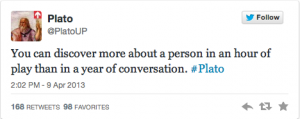April 9, 2014 at 9:11 am

It can be strange to think sometimes of the humanities and sciences meeting. A poetic stanza has very little to do with a mathematical equation one would think; not Edna St. Vincent Millay. In this poem, “Euclid alone has looked on Beauty bare”, the Father of Geometry can see what poets, those so attuned to pointing out the beauty of the world, cannot. Here is the text:
Euclid alone has looked on Beauty bare.
Let all who prate of Beauty hold their peace,
And lay them prone upon the earth and cease
To ponder on themselves, the while they stare
At nothing, intricately drawn nowhere
In shapes of shifting lineage; let geese
Gabble and hiss, but heroes seek release
From dusty bondage into luminous air.
O blinding hour, O holy, terrible day,
When first the shaft into his vision shone
Of light anatomized! Euclid alone
Has looked on Beauty bare. Fortunate they
Who, though once only and then but far away,
Have heard her massive sandal set on stone.
By fegoss01
|
Posted in Art, Other Publications
|
Tagged euclid, geometry, Humanities, natural science, poem, poetry
|
March 30, 2014 at 7:18 pm
Silence is hot right now. On the market, it takes the form of headphones, train compartments, dishwashers, vaccum cleaners, and a whole lot of other products that have taken the absence of sound and packaged it up for capitalistic consumption. Not to say that there is necessarily anything wrong with this--but how does it reflect on our society's reception (ha-ha) of sound? According to a recent New Republic article, the commoditization of silence is a testament to today's consumer's itch "to shed modern life’s “noisy” baggage: all those emails, texts, and bits of media—digital, social, etc.—that clutter our consciousness." Ironically, the increase in the past few decades of aural turbulence, which has accompanied the technological revolution as it was ushered in, is responsible for a new trend of wanting some sort of simplicity or purity; in the case of "sound pollution", this means silence. In the article, those following this trend are referred to as "disconnectionists". Read More »
By njanes
|
Posted in Uncategorized
|
March 28, 2014 at 11:42 am
Prompted by Dean Sapiro’s lecture on Mary Wollstonecraft to question why there are so few women authors in the Core Humanities, Prof. David Green had his CC 202 students this week momentarily put aside Pride and Prejudice and the question of whether happiness in marriage is a matter of chance to consider the criteria for including authors in our curriculum. In the following guest post, Prof. Green reports on the results of those conversations, and gives his own reflections on the matter of Core and the canon.
Read More »
By zakbos
|
Posted in Academics, Core Authors, Great Ideas, Great Questions
|
Tagged canon, faculty, Humanities, reading, syllabus
|
March 27, 2014 at 10:06 pm
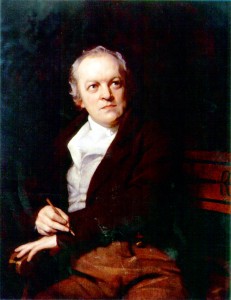 Who was William Blake? Ask a CC202 student and they'll tell you he was an English Romantic poet. They're right but that's not all. Blake was also a talented artist and many of his subjects will appear familiar to keen-eyed core students. We thought we'd take a moment to share a bit of this lesser known side of Blake.
Who was William Blake? Ask a CC202 student and they'll tell you he was an English Romantic poet. They're right but that's not all. Blake was also a talented artist and many of his subjects will appear familiar to keen-eyed core students. We thought we'd take a moment to share a bit of this lesser known side of Blake.
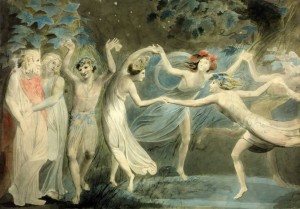
Oberon, Titania and Puck with Fairies Dancing (1786)
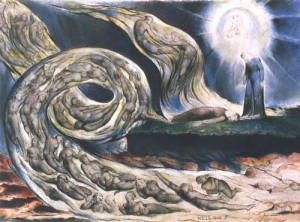
The Lovers Whirlwind illustrating Canto V of Dante's Inferno
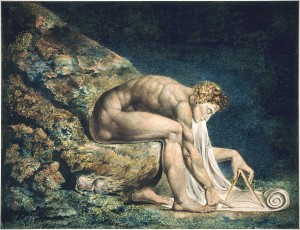
Newton (1795)
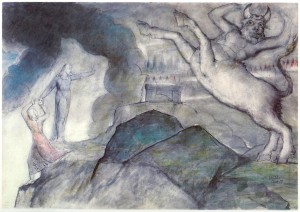
Depiction of the Minotaur from Dante's Inferno
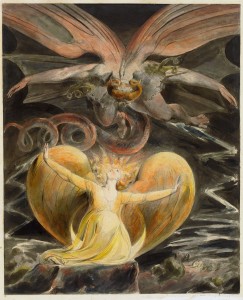
The Great Red Dragon and the Woman Clothed with Sun (1805)
By vpriest
|
Posted in Art, Great Personalities
|
Tagged Blake, Romantics, William Blake
|
March 25, 2014 at 2:09 am
Apparently, elevators have been much more essential to the development of our modern nation's urban layout and cultural life than we ever thought to give them credit for. As the elevator enthusiasts of academia maintain, the invention of the elevator paved the way for a new, innovative high-rise style of architecture.

The Woolworth Building in New York, completed in 1913 and rising up to 792 feet in the sky.
Not only this, but elevators have also been credited by its appreciators for reshaping the social hierarchy of commercial and residential buildings. Originally, the top floors of, let's say, a large house were reserved for those expected to hike up several flights of stairs--namely, this demographic included servants and staff. Before elevators, the well-off folks dwelled on bottom floors.
Read More »
By njanes
|
Posted in Uncategorized
|
March 25, 2014 at 12:29 am
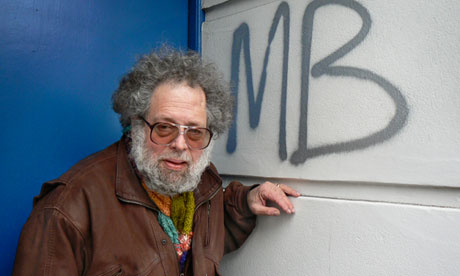
Last fall, Marshall Berman, a Jewish American philosopher, Marxist humanist writer and professor of political science at The City College of New York, passed away. Vladislav Davidzon writes about his late teacher in Tablet Magazine, painting a portrait of him as a brilliant nonconformist and engaging teacher:
In hindsight, I am impressed by how neatly he synthesized the brackish world of 19th-century Russian revolutionary politics for American undergraduates, light-years removed from it. I see, on opening my notes from that autumn, that the first line I wrote down in my notebook in that class might be taken for Marshall’s credo. “Must we wait for after the revolution for joy?” This was followed by a resounding “No!”
Read More »
By vpriest
|
Posted in Uncategorized
|
March 24, 2014 at 2:44 pm
Are you living an examined life?
No, really, are you? In between texting while walking, daydreaming while note-taking, scrolling while sleeping, and sleeping while strolling, are you living an examined life?
It's ok if you are not. Few are. But it's an important question to ask oneself, and that's why philosophy matters.
Clancy Martin, in his review of Rebecca Goldstein's book, Plato at the Googleplex: Why Philosophy Won’t Go Away, discusses questions that science cannot answer but philosophy can. Some extracts:
Goldstein wisely doesn’t take philosophy’s revival for granted in a culture committed to an increasingly materialistic worldview—materialistic in the philosophical sense, meaning convinced that the scientific study of matter in motion holds the answers to all our questions. The impetus for Goldstein’s ingenious, entertaining, and challenging new book is the theoretical version of the very practical problem I confronted when I graduated from college: Now that we have science, do we really need philosophy? Doesn’t science “bake bread” (not to mention make money) in a way that philosophy never has? Science is responsible for the grand upward march of civilization—so we are often told—but what accomplishments can philosophy claim?
Read More »
By mdimov
|
Posted in Academics, Core Authors, Great Questions
|
Tagged Clancy Martin, Kirkegaard, meaning, philosophy, Plato, progress, questions, Rebecca Goldstein, Science
|
March 23, 2014 at 1:18 pm
By fegoss01
|
Posted in Uncategorized
|
March 19, 2014 at 2:28 pm

On Friday of the week before Spring Break, Prof. Green was speaking with his classes about the importance of "human knowledge." What brought that topic to mind? Well, on his way to work, walking down Beacon Street through Coolidge Corner, he'd seen the book pictured above propped up by some unknown person, against a lamp post outside a Russian bookstore. Read More »
By zakbos
|
Posted in Great Photograph
|
Tagged books, bookstore, David Green, gnosis, photography
|







